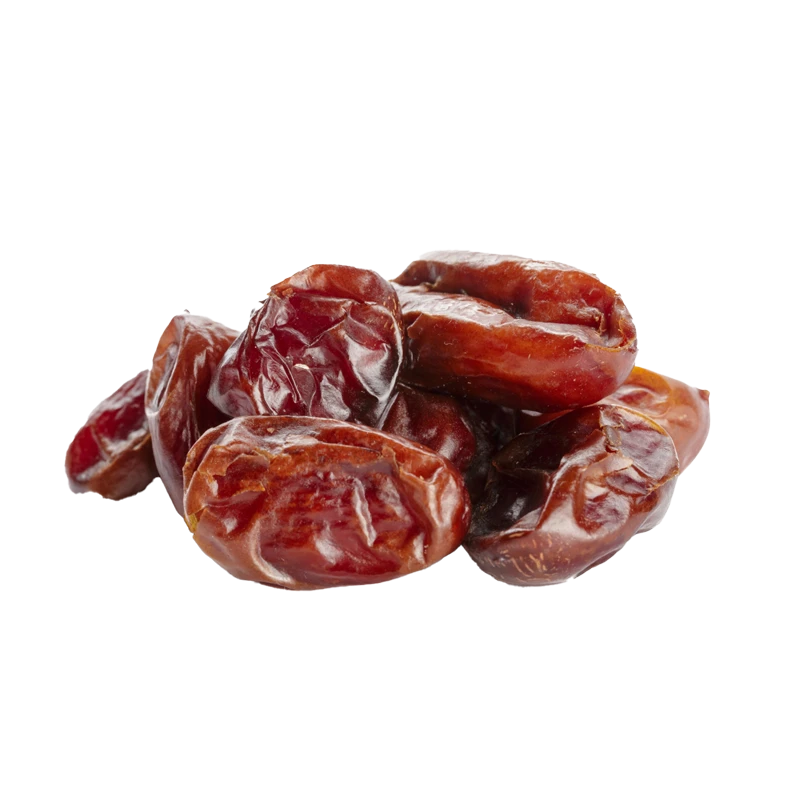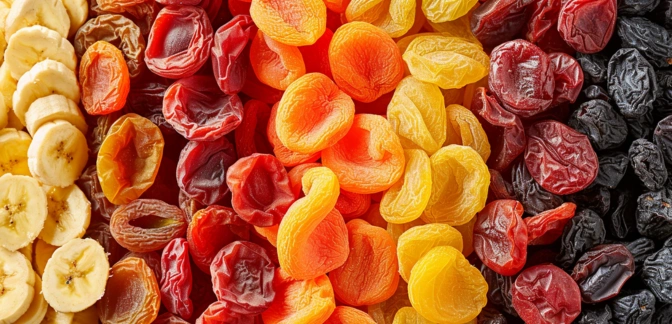Dates — Nutrients, Health Benefits, And Shopping Tips

Written by Listonic Team
Last update on September 4, 2024
Nutrients
Nutrition facts
Amount per 100 g
Calories
🔥 277 kcal
| Nutrition per: 100 g | Value | % Daily Value* |
|---|---|---|
| Carbs | 75 g | 27.27% |
| Fiber | 7 g | 25% |
| Sugars | 63 g | 126% |
| Glycemic Index | 42 | - |
| Protein | 2 g | 4% |
| Sodium | 1 mg | 0.04% |
| Total Fat | 0 g | - |
*The % of Daily Value (DV) tells you how much a nutrient in a serving of food contributes to a daily diet. 2,000 calories a day is used for general nutrition advice.
7 g
🥔 Good Fiber Content
42
🟢 Low Glycemic Index
Key takeaways
Health benefits
- High in natural sugars, providing a quick and sustained source of energy.
- Rich in fiber, promoting digestive health, regular bowel movements, and a healthy gut microbiome.
- Contains essential vitamins and minerals such as Vitamin B6, potassium, magnesium, and copper, which support overall health and well-being.
- Supports bone health due to their content of minerals like calcium, phosphorus, and magnesium.
- May promote brain health due to their antioxidant properties and ability to reduce inflammation and oxidative stress.
Health risks
- High sugar content which can contribute to weight gain, tooth decay, and increased risk of diabetes if consumed frequently, particularly in large quantities.
- High calorie content which can contribute to weight gain if consumed frequently or in large portions, especially as a snack food.
- Digestive discomfort such as bloating, gas, or diarrhea when consumed in large quantities due to their high fiber content.
- Risk of allergic reactions in some individuals, causing symptoms like itching, swelling, or difficulty breathing, particularly if allergic to other dried fruits.
How to choose dates
When evaluating dates, ensure they have a glossy sheen and are uniformly brown without any crystallized sugar on their surface. They should feel sticky but not overly moist. Smell the dates for a rich, caramel-like aroma.
Do not purchase dates that are hard or have a sour smell, as these are indicators they are past their prime. Good quality dates will be tender and chewy with a naturally sweet flavor.

How to store dates
Dates should be kept in a sealed container at room temperature. Storing them in a cool, dark location helps retain their natural sweetness. Properly stored, dates can last for several months.
Excessive moisture can make dates overly sticky and prone to spoilage. They should be kept away from humid areas. A tight seal on the container will help maintain their texture and prevent drying out.
✅ Extra Tip
How long do they last?
Dates can last for 6-12 months when stored in an airtight container in a cool, dark place. For longer storage, they can be refrigerated or frozen, where they can last up to 1 year.
What to do with leftovers?
Leftover dates can be used in a variety of sweet and savory dishes. Chop them and add to salads with greens, nuts, and a tangy vinaigrette, or mix them into baked goods like muffins, cookies, or bread for natural sweetness. Dates are also great in smoothies, where they add a rich, caramel-like flavor.
Use dates to make a date paste by blending them with water, perfect for sweetening recipes or spreading on toast. If you have a lot of dates, consider stuffing them with cream cheese or nuts for a quick and elegant appetizer. Dates can also be chopped and mixed into grain bowls with quinoa or couscous, or used as a sweet addition to couscous or rice dishes. For a healthy snack, enjoy dates on their own or mix them into a trail mix with nuts and seeds.
👨⚕️️ Medical disclaimer
Discover products from other categories
Listonic Team
Fact-checked
Our editorial team checked this article to make sure it was accurate at the time of publishing it.
Get the top-rated shopping list app

dates
1 piece







